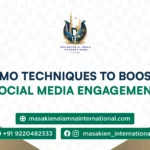
The Best Social Media Platforms for B2B vs. B2C Marketing in 2025
By 2025, different social media will be used mainly for communication with brands, customer engagement, and sell conversions. But not every platform can work well for every business. The great discernment lies between B2B (Business-to-Business) and B2C (Business-to-Consumer) marketing. Knowing which platform goes best with your brand goals is important to success.
This article puts forth the top social media channels for B2B and B2C marketers in 2025 and will provide you with certain criteria for choosing your channel based on the style of your audience, content, and campaign.
Understanding B2B vs B2C Marketing
B2B Marketing (Business-to-Business)
B2B marketing is the promotion of goods and services from one business to another. Typically, it is targeted at professionals, decision-makers, or organizations, and involves long sales cycles along with high-value transactions. The content is frequently educational and data-driven, plus, there is a whole lot of focus on establishing trust. The best platforms for B2B are those that allow relationship-building and thought leadership.
B2C Marketing (Business-to-Consumer)
B2C marketing seeks to target individual consumers who operate on personal needs, desires, and emotions. In this selling usually has a shorter and more impulsive sales cycle than B2B. Content has to appeal to humans by being engaging, relatable, and emotion-driven. Again, B2C would go best with platforms that boast of visual and storytelling abilities.
Social Media Platforms to Watch in 2025
Let’s take a tour of the most popular social platforms and analyze their uses in B2B and B2C marketing.
-
LinkedIn: First Choice for B2B Marketing
Why LinkedIn Is Great for B2B in 2025
LinkedIn remains the holy grail of B2B marketing channels, having an audience full of professional-level executives and decision-makers of all stripes. With the right strategies implemented, it gives marketers the ability to very specifically identify and target persons based on job title, industry, and company size. This translates to reaching the right people precisely. The platform embraces a range of professional content formats, including whitepapers, industry reports, and webinars. Coupled with features like LinkedIn Newsletters and LinkedIn Live, it gives brands the framework to create brand authority and nurture long-term relationships.
Why LinkedIn Is Not Suitable for B2C Targeting
Being the go-to social networking site for B2B marketers, it boasts of a user base comprising professionals, executives, and decision-makers. Implying that it allows very targeted marketing based on the job profile, industry, and company size of the audience being aimed at. The platform typically supports professional content such as whitepapers, industry reports, and webinars. The brand can build authority through LinkedIn Newsletters and nurture long-term relationships through LinkedIn Live.
Why LinkedIn Is Not B2C Friendly
LinkedIn is a more formal setting. It just does not work with casual or lifestyle-related content that resonates with the everyday consumer. While the platform can be used for employer branding or recruiting, it cannot be set up for impulse buying or viral entertainment. The B2C brand would somehow challenge inducing the emotional involvement that is often seen on Instagram or TikTok.
-
Instagram: Visual Wonderland of B2C
Why Instagram Is Great for B2C
Instagram is a very visual platform that does very well for brands in fashion, beauty, travel, food, and the lifestyle domain. B2C marketers showcase the product through Stories, Reels, and product tagging to allow instant purchase. The facility for user-generated content and influencer collaborations allows brands to develop a trust factor and expand their reach. The evocative nature of Instagram makes storytelling easy and highly engaging for consumers.
Why Is It Bad for a B2B?
While some B2B brands attempt to humanize themselves on Instagram, this platform is mostly built around personal and lifestyle content. Complex services and professional solutions are more difficult to explain in bite-sized bites of aesthetically pleasing posts. There are also no professional targeting and lead generation tools that one would find on LinkedIn. Check out our latest blog post on Content Clusters: The Secret to Pillar Page Topic Authority
-
Facebook (Meta) – A B2C Legacy Platform
Why it Still Works for B2C
Despite new platforms coming up for attention, Facebook remains valuable for brands with an older and family-oriented demographic. The very nature of Facebook Groups is community engagement, so they make for building loyal customers. Facebook Ads also have detailed targeting tools based on interests and behaviors, and demographics. These features, in-app shopping, Marketplace, help with product discovery and product conversions in the local market.
Why it’s Not Great for B2B
Although some B2B companies on Facebook may use it for events or general awareness, it lacks the professional tone and audience that LinkedIn can offer. Complex B2B messages get diluted in the casual and entertainment-fueled feed of Facebook. Hence, Facebook is better suited for B2C brands looking for engagement and brand loyalty.
-
X (Formerly Twitter)-Real-Time B2C Interaction
Why X Is Useful for B2C
X continues to be a powerhouse of engagement in real-time conversations, especially for brands eager to jump on trends and pop culture. It lands perfectly for customer support, lesser updates, and viral marketing. B2C brands use it to announce new products, promotions, and quips designed to be retweeted and attain brand exposure. Short-form and snappy keep the audience heavily engaged.
Why X Is Limited for B2B
For B2B, X could be employed in the secondary capacity of thought leadership or coverage for live events. However, it lacks the ability and depth required to expound on complex products or services. Limits on characters and a preference for entertainment rather than education render it the least viable option as a tool for lead nurturing or acquiring clients within a B2B framework.
-
TikTok-Marketing B2C
Why TikTok Will Continue Emerging as B2C Powerhouse in 2025
Keeping the youth firmly ensnared in its bewitching charms of engagement, TikTok converses in an algorithm that upholds creative, relatable, and entertaining content, with such opportunities that sometimes can take a small brand to virality with less ad spend. They give short videos for some product use cases, behind-the-scenes process, or just a simple customer testimonial to nurture that authenticity. Furthermore, direct purchase options are integrable, so they completely convert the viewer into a buyer without leaving the app.
Why TikTok Is Not B2B-Friendly
B2B brands struggle to adapt their messaging to TikTok’s playful tone and fast trends. Most B2B content will feel out of place on TikTok unless it happens to be in some creative or technical space. The TikTok audience expects humor, storytelling, and realness—the kind of elements that advertising B2B folks might deliberately shun.
-
YouTube – The Grand Platform for Long-Form Excellence for Both B2B and B2C
Why YouTube Is Effective for B2B
YouTube is great when businesses want to educate the audience through in-depth content. B2B marketers can put on YouTube tutorials, explainer videos, product demonstrations, and testimonials. The platform facilitates SEO-rich content, thus granting better chance for brands to rank on industry-related queries.
Why YouTube Works for B2C
For B2C brands, YouTube provides every opportunity to craft compelling brand stories through vlogging, unboxing, how-to content, or influencer reviews. It cultivates long attention spans and deeper connections between the brand and its client. Unlike other short-form digital media platforms, users on YouTube are providing proactive search before consumption of detailed information that influences purchase decisions.
-
Emerging Platforms – Threads, Discord, Reddit, and Pinterest
Threads – Text-Based B2C Engagement on the Rise
Threads launched by Instagram engrosses real-time text-based sharing and discussion. It gives B2C brands a fresh avenue for quick updates, casual interactions, or product teasers, excellent for audience engagement and forming a brand voice in a text-first manner. Nevertheless, it is in the development stage and promises well for conversational marketing.
Discord – Niche Community Creation
Discord is an amazing platform that provides the opportunity for brands to create one or multiple servers for conversations, conducting events, and building niche communities. Basically, B2B SaaS and B2C-gaming-related companies use it to keep their most fiercely loyal user base intact. Best practice that brands should consider in Discord, apart from direct selling, is enabling value-added discussions.
Reddit-Wise Conversations and Reviews
Reddit is the place to be for honest product reviews, involvement in conversations, and being a part of a community. On B2C grounds, good engagement with users is carried out with Ask Me Anything (AMAs) sessions, contests, giveaways, and participation in subreddits. B2B brands use Reddit for thought leadership or niche communities, but the approach has to be soft and sincere to avoid negativity.
Pinterest-Visual Inspiration for B2C
Pinterest remains a force to reckon with in terms of visual planning and discovery of products in various niches-from home décor to fashion, food, and weddings. Visionary brands can direct a lot of traffic to their websites via pins that link back to their e-commerce or blog content. It’s for the long haul when it comes to branding rather than instant engagement.
Key factors to consider before choosing your platform
-
Knowing the Demographic
When it comes to social media platforms, audience preferences are typically tied to time and space. The audience on LinkedIn is heavily professional, whereas the audience on TikTok is mainly Gen Z. Facebook seems to attract an older crowd, while Instagram gets a lot of limelight from millennials with creative ideas. In short, the better you can define your target demographic, the easier it becomes to pick the right platform.
-
Content Format Alignment
One way or the other, all platforms support content types- LinkedIn focuses on articles and infographics, TikTok and Instagram feed off short-form videos, YouTube supports long-form, and Twitter is how during bite-sized updates. Hence, your conversion capabilities should steer you toward the platform that complements your strengths.
-
Business Objectives
If you are driving for lead generation, LinkedIn and YouTube fare better with B2B, while Instagram and TikTok are more suitable for driving B2C conversions. Facebook and Reddit are good for community engagements, and X is for emphasizing customer service or getting timely updates. Try defining first what’s the very goal of your business—awareness, engagement, or sales?
-
Budget and Resources
How much you allocate for production is usually set by the platform. Production for TikTok and YouTube means creative video production, whereas it’s more writing text and screenshots for LinkedIn and X.
Conclusion
When choosing the right social media platform in 2025, one should stop just following the crowd and see to how their brand aligns with platforms where their target audience actively engages. LinkedIn sits atop B2B marketing, followed by YouTube, based largely on information or relationship-oriented marketing. On the consumer side, platforms, Instagram, TikTok, and Facebook, allow obscene levels of creativity, quick-click conversions, and viral reach.
Every platform has its set of special strengths, and the marketers who blend differently will embed in meaningfully in the eyes of their audience. Contact us as With the rise in content expectations, those enterprises will stand out that are tied to relevance, value, and authenticity, regardless of the platform.





1 Comment
How to Use LinkedIn for Lead Generation in B2B Marketing - Masakienalamnainternational
July 29, 2025
[…] Educating the market nurtures trust and awareness, and when the buyer is ready to make a decision, they will most likely choose you because of the pre-sale value you provided. Check out our latest blog post on The Best Social Media Platforms for B2B vs. B2C Marketing in 2025 […]